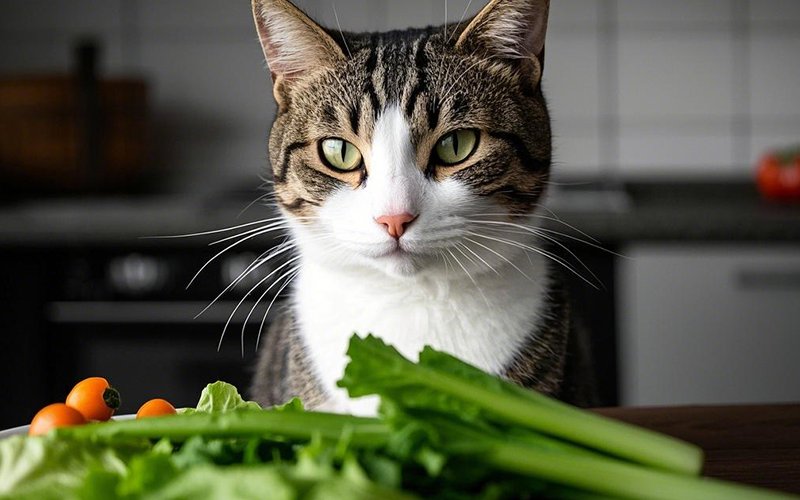Can Cats Eat Veggies? What You Need to Know
- 15 Mar 2025 13:53
Cats are obligate carnivores, meaning that their bodies are designed to thrive on a diet primarily composed of animal-based proteins. However, many cat owners wonder if it's okay to share some vegetables with their furry friends. While veggies are not a natural part of a cat’s diet, some vegetables are safe and can even offer health benefits when given in moderation. Let’s dive into which veggies are safe for cats and how to introduce them to your cat’s diet. 🥦🐱

1. Can Cats Eat Vegetables?
Yes, cats can eat certain vegetables, but they should only be offered as an occasional treat. Vegetables do not provide the essential nutrients that cats need to thrive, such as taurine (an amino acid found in meat) or vitamin A. Cats’ digestive systems are adapted to a protein-rich, meat-based diet, so vegetables should not replace their primary food source.
However, some vegetables can provide extra fiber and vitamins that can aid in digestion and support your cat’s overall health.
2. Safe Vegetables for Cats
If you want to introduce veggies to your cat’s diet, here are some safe options to try:
Carrots: Cooked or raw carrots can be a crunchy, safe treat for cats. Carrots are rich in fiber and vitamin A, which is good for vision and immune health.
Peas: Peas are another safe veggie for cats, offering fiber, protein, and essential vitamins. Make sure to offer them in small quantities and avoid any added salt or seasoning.
Spinach: Spinach can be a healthy option for cats when given in moderation. It’s rich in iron and antioxidants. However, too much spinach can contribute to kidney issues in cats with pre-existing health problems, so it's best to offer it sparingly.
Pumpkin: Pumpkin is a great vegetable for cats as it’s high in fiber and can help with digestive issues like constipation or diarrhea. Make sure to offer plain, cooked pumpkin without any added sugar or spices.
Zucchini: Zucchini is low in calories and high in water content, making it a hydrating and low-calorie treat for cats. It’s safe to give to cats in small amounts.
3. Vegetables to Avoid Giving to Cats
While some veggies are safe for cats, others can be harmful or difficult for them to digest. Here are some vegetables you should avoid:
Onions and Garlic: Both onions and garlic contain compounds that can damage your cat’s red blood cells, leading to anemia. These vegetables are toxic to cats and should be avoided entirely.
Tomatoes: While tomatoes are technically a fruit, they contain solanine, a toxic substance found in the green parts of the plant. Raw tomatoes or their leaves can be harmful to cats.
Avocado: Avocados contain a substance called persin, which is toxic to some animals, including cats. It’s best to avoid offering avocado to your cat.
Mushrooms: While not technically a vegetable, mushrooms can be toxic to cats, especially wild mushrooms. Stick to safe, cat-friendly veggies to avoid accidental poisoning.
4. How to Introduce Vegetables to Your Cat
If you want to offer vegetables to your cat, follow these guidelines:
Start Slowly: Introduce vegetables gradually into your cat’s diet and monitor their response. Not all cats will enjoy or tolerate veggies, so watch for any signs of digestive upset, like vomiting or diarrhea.
Offer Small Pieces: Cut veggies into small, manageable pieces to prevent choking and make them easier for your cat to eat.
Cooked vs. Raw: Some vegetables, like carrots and pumpkin, are easier for cats to digest when cooked. Others, like zucchini and peas, can be given raw, but make sure to remove any tough stems or skins.
5. How PettureX Can Help You Manage Your Cat’s Diet
If you’re ever unsure about what foods are safe for your cat, PettureX can offer expert guidance. PettureX is a pet AI assistant that provides 24/7 advice on pet health, including dietary concerns. With its image recognition tool, PettureX can help you identify whether a specific food is safe for your cat and help keep your pet healthy. 🐱📱
6. Conclusion: Can Cats Eat Vegetables?
Yes, cats can eat certain vegetables, but they should be offered as a small, occasional treat rather than a regular part of their diet. Vegetables like carrots, peas, spinach, and pumpkin can be a healthy addition to your cat’s meals when prepared correctly. However, always avoid toxic vegetables like onions, garlic, and tomatoes.
Remember, your cat’s primary diet should be meat-based, so vegetables should not replace essential animal proteins. If you’re ever in doubt about what to feed your cat, PettureX is a helpful resource for making informed decisions.
So, while cats may enjoy the occasional veggie, always make sure to choose safe options and keep their diet balanced! 🥦🐾
Related

The Burning Question: Can Cats Eat Jalapenos? A Comprehensive Safety Guide
- 21 Apr 2025
Cool Temptation: Can Cats Eat Ice Cream Safely? The Vet-Backed Truth
- 21 Apr 2025
Frankly Dangerous: Can Cats Eat Hot Dogs? Vet Explains the Serious Risks
- 16 Apr 2025
A Purrfect Protein? Can Cats Eat Ground Turkey Safely? (Vet-Reviewed Guide)
- 16 Apr 2025
Gritty Situation: Can Cats Eat Grits Safely? Vet Explains the Risks
- 16 Apr 2025
Crunchy Query: Can Cats Eat Green Peppers? A Vet-Reviewed Safety Analysis
- 16 Apr 2025
Gravy Danger Zone: Can Cats Eat Gravy Safely? (Vet-Reviewed Warning)
- 16 Apr 2025
Toxic Temptation: Can Cats Eat Grapefruit? Vet Explains the Dangers
- 16 Apr 2025
Emergency Meal or Major Mistake? Can Cats Eat Dog Food For A Couple Days? (Vet Guide)
- 16 Apr 2025
Dandelions & Felines: Can Cats Eat These Common Weeds Safely? Vet Explains
- 16 Apr 2025
